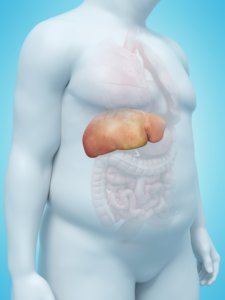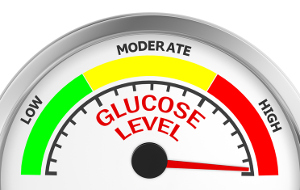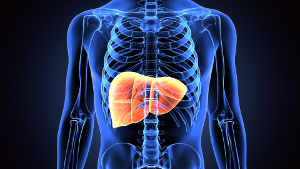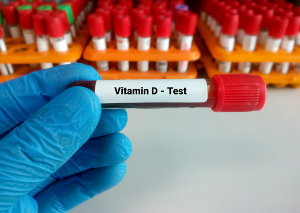 If you have a large waist circumference, you are more likely to have low blood levels of vitamin D, according to a study that was presented at the annual meeting of the European Society of Endocrinology (ESE) in Barcelona in 2018. The researchers therefore suggest that overweight individuals with a large waist circumference have their vitamin D levels measured, as this may help prevent many of the health problems that are linked to low vitamin D levels, including such things as an increased risk of infections, cardiovascular disease, osteoporosis, winter depression, blood sugar irregularities, diabetes, autoimmune diseases, and cancer.
If you have a large waist circumference, you are more likely to have low blood levels of vitamin D, according to a study that was presented at the annual meeting of the European Society of Endocrinology (ESE) in Barcelona in 2018. The researchers therefore suggest that overweight individuals with a large waist circumference have their vitamin D levels measured, as this may help prevent many of the health problems that are linked to low vitamin D levels, including such things as an increased risk of infections, cardiovascular disease, osteoporosis, winter depression, blood sugar irregularities, diabetes, autoimmune diseases, and cancer.
 According to a new study from Johns Hopkins University in the United States, vitamin D is able to protect overweight children against asthma caused by urban air pollution. Sunshine during the summer period is the main source of vitamin D, but due to our modern lifestyles, many people, including children, fail to get enough of the nutrient. This may have widespread consequences, as lack of vitamin D also increases the risk of overweight.
According to a new study from Johns Hopkins University in the United States, vitamin D is able to protect overweight children against asthma caused by urban air pollution. Sunshine during the summer period is the main source of vitamin D, but due to our modern lifestyles, many people, including children, fail to get enough of the nutrient. This may have widespread consequences, as lack of vitamin D also increases the risk of overweight.
 Inflammation appears to be a key factor in the majority of chronic illnesses such as e.g. rheumatism, type-2 diabetes, and cancer. Science has primarily focused on EPA (eicosapentaenoic acid), but new research points to supplementation with DHA (docosahexaenoic acid) as being even more effective in healthy patients with too much abdominal fat and subclinical systemic inflammation.
Inflammation appears to be a key factor in the majority of chronic illnesses such as e.g. rheumatism, type-2 diabetes, and cancer. Science has primarily focused on EPA (eicosapentaenoic acid), but new research points to supplementation with DHA (docosahexaenoic acid) as being even more effective in healthy patients with too much abdominal fat and subclinical systemic inflammation.
 It has been known for a long time that a lack of vitamin D increases your risk of overweight. Now, an Italian study gives a whole new view on low vitamin D and how it is linked to elevated levels of TMAO (Trimethylamine N-oxide), a metabolite that increases the risk of non-alcoholic fatty liver and accompanying complications such as insulin resistance, diabetes, and cardiovascular disease. The scientists also looked at the gut flora’s and the liver’s roles in TMAO production and the fact that low vitamin D levels and overweight are a vicious cycle. It appears that overweight people need more vitamin D than the recommended level. In terms of non-alcoholic fatty liver, we will also be looking at the controversial delicacy, foie gras, and the fact that carbohydrate overconsumption burdens your liver.
It has been known for a long time that a lack of vitamin D increases your risk of overweight. Now, an Italian study gives a whole new view on low vitamin D and how it is linked to elevated levels of TMAO (Trimethylamine N-oxide), a metabolite that increases the risk of non-alcoholic fatty liver and accompanying complications such as insulin resistance, diabetes, and cardiovascular disease. The scientists also looked at the gut flora’s and the liver’s roles in TMAO production and the fact that low vitamin D levels and overweight are a vicious cycle. It appears that overweight people need more vitamin D than the recommended level. In terms of non-alcoholic fatty liver, we will also be looking at the controversial delicacy, foie gras, and the fact that carbohydrate overconsumption burdens your liver.
- but are all those dairy products really necessary?
 Eating breakfast has a positive effect on cognitive skills such as memory and learning in children and teenagers, according to an article about Danes and their breakfast habits that is published in Nutrients. However, many children are delivered in their institutions early in the morning, in some cases without even having had a chance to eat breakfast. The Danish Veterinary and Food Administration therefore recommends offering these children the chance of eating breakfast in their institutions. It seems that symptoms such as poor concentration, hyperactivity, and apathy, which tend to be viewed as psychological problems, are often the result of not eating breakfast, having low blood sugar levels, and lacking essential vitamins, minerals, and essential fatty acids. In the following, you can read more about the value of eating a healthy breakfast, while you can find out more about the low-fat dairy products that actually increase your risk of unstable blood sugar and overweight.
Eating breakfast has a positive effect on cognitive skills such as memory and learning in children and teenagers, according to an article about Danes and their breakfast habits that is published in Nutrients. However, many children are delivered in their institutions early in the morning, in some cases without even having had a chance to eat breakfast. The Danish Veterinary and Food Administration therefore recommends offering these children the chance of eating breakfast in their institutions. It seems that symptoms such as poor concentration, hyperactivity, and apathy, which tend to be viewed as psychological problems, are often the result of not eating breakfast, having low blood sugar levels, and lacking essential vitamins, minerals, and essential fatty acids. In the following, you can read more about the value of eating a healthy breakfast, while you can find out more about the low-fat dairy products that actually increase your risk of unstable blood sugar and overweight.
 Type 2 diabetes is spreading like a bushfire and even more people suffer from something called metabolic syndrome, a prediabetic stage characterized by insulin resistance, hypertension, elevated cholesterol, and apple-shaped figure caused by a blood sugar imbalance. Chromium supplementation helps improve insulin sensitivity and lowers weight and blood pressure, thereby reducing the risk of cardiovascular disease, according to a placebo-controlled study that is published in the journal Biological Trace Element Research. It is advisable to lower your carbohydrate intake and to choose a chromium supplement with good bioavailability.
Type 2 diabetes is spreading like a bushfire and even more people suffer from something called metabolic syndrome, a prediabetic stage characterized by insulin resistance, hypertension, elevated cholesterol, and apple-shaped figure caused by a blood sugar imbalance. Chromium supplementation helps improve insulin sensitivity and lowers weight and blood pressure, thereby reducing the risk of cardiovascular disease, according to a placebo-controlled study that is published in the journal Biological Trace Element Research. It is advisable to lower your carbohydrate intake and to choose a chromium supplement with good bioavailability.
 The trace element chromium improves the effect of insulin, the hormone that helps glucose enter our cells. Chromium is needed for normal sugar metabolism that is closely linked to normal lipid metabolism and weight control. According to a new study of rodents, a chromium-deficient diet that is rich in carbohydrate and fat, increases hunger and energy intake. Also, levels of insulin and lipids in the blood increase, and there is weight gain and an increased risk of developing type 2 diabetes. The new study supports earlier studies of humans where it was seen that chromium is important for both blood sugar levels and weight control. When using chromium supplements, make sure to choose a product with chromium yeast that has good absorption. Also make sure to get plenty of protein that contributes to blood sugar management and fat burning, which makes it easier to lose weight.
The trace element chromium improves the effect of insulin, the hormone that helps glucose enter our cells. Chromium is needed for normal sugar metabolism that is closely linked to normal lipid metabolism and weight control. According to a new study of rodents, a chromium-deficient diet that is rich in carbohydrate and fat, increases hunger and energy intake. Also, levels of insulin and lipids in the blood increase, and there is weight gain and an increased risk of developing type 2 diabetes. The new study supports earlier studies of humans where it was seen that chromium is important for both blood sugar levels and weight control. When using chromium supplements, make sure to choose a product with chromium yeast that has good absorption. Also make sure to get plenty of protein that contributes to blood sugar management and fat burning, which makes it easier to lose weight.
- and a common trait in most chronic diseases
 Although chronic inflammation is not something that you feel as such, it sets the stage for a number of symptoms and a host of different diseases including fatigue, overweight, diabetes, cardiovascular disease, rheumatism, metabolic disorders, asthma, periodontal disease, bowel infections, depression, Alzheimer’s disease, sclerosis, and cancer. Not surprisingly, people are more and more hooked on the anti-inflammatory lifestyle, and we will take a closer look at studies showing how fish oil, vitamin D, selenium, magnesium, and zinc contribute to preventing and fighting inflammation, related diseases and premature death. Any nutritional supplements must be of a proper quality that the body can absorb, and they should contain therapeutic dosages.
Although chronic inflammation is not something that you feel as such, it sets the stage for a number of symptoms and a host of different diseases including fatigue, overweight, diabetes, cardiovascular disease, rheumatism, metabolic disorders, asthma, periodontal disease, bowel infections, depression, Alzheimer’s disease, sclerosis, and cancer. Not surprisingly, people are more and more hooked on the anti-inflammatory lifestyle, and we will take a closer look at studies showing how fish oil, vitamin D, selenium, magnesium, and zinc contribute to preventing and fighting inflammation, related diseases and premature death. Any nutritional supplements must be of a proper quality that the body can absorb, and they should contain therapeutic dosages.
 Yet another scientific study confirms that CLA is effective. A new Spanish double-blind randomized study has shown that 3 g of CLA daily given to a group of healthy, overweight persons, reduced their amount of fat and their weight over a period of 24 weeks.
Yet another scientific study confirms that CLA is effective. A new Spanish double-blind randomized study has shown that 3 g of CLA daily given to a group of healthy, overweight persons, reduced their amount of fat and their weight over a period of 24 weeks.
 For the first time ever scientists from California have discovered copper's role in the burning of fat. This improves the nutrient's reputation as an essential nutrient.
For the first time ever scientists from California have discovered copper's role in the burning of fat. This improves the nutrient's reputation as an essential nutrient.
- with non-alcoholic fatty liver disease
 Weight-challenged children and teenagers have grown to become a global health threat, and the problem became even worse during the corona pandemic. Overweight is linked to a number of health problems, including non-alcoholic fatty liver disease that sets the stage for type 2 diabetes and other serious ailments. In a new review article that is published in Nutrients, researchers look closer at how a carbohydrate-restricted diet or the traditional Mediterranean diet can help to counteract the development of overweight and non-alcoholic fatty liver disease. Also, supplementation with vitamin E, vitamin D, fish oil, and probiotics can block the development of non-alcoholic fatty liver via different metabolic parameters.
Weight-challenged children and teenagers have grown to become a global health threat, and the problem became even worse during the corona pandemic. Overweight is linked to a number of health problems, including non-alcoholic fatty liver disease that sets the stage for type 2 diabetes and other serious ailments. In a new review article that is published in Nutrients, researchers look closer at how a carbohydrate-restricted diet or the traditional Mediterranean diet can help to counteract the development of overweight and non-alcoholic fatty liver disease. Also, supplementation with vitamin E, vitamin D, fish oil, and probiotics can block the development of non-alcoholic fatty liver via different metabolic parameters.
 Women who are overweight before becoming pregnant have an increased risk of abnormal fetal growth and low birth weight. However, it appears that fish oil supplementation can lower the risk of these complications, according to a new pilot study that is published in the science journal, Nutrients. The scientists behind the study explain how omega-3 fatty acids in fish oil support a healthy pregnancy and help control inflammation, insulin sensitivity, and lipid metabolism, all of which tend to be off balance in overweight pregnant women.
Women who are overweight before becoming pregnant have an increased risk of abnormal fetal growth and low birth weight. However, it appears that fish oil supplementation can lower the risk of these complications, according to a new pilot study that is published in the science journal, Nutrients. The scientists behind the study explain how omega-3 fatty acids in fish oil support a healthy pregnancy and help control inflammation, insulin sensitivity, and lipid metabolism, all of which tend to be off balance in overweight pregnant women.
 Non-alcoholic fatty liver disease (NAFLD) is a liver disease that is spreading like a bushfire. NAFLD is associated with obesity and metabolic syndrome, which is an early stage of type 2 diabetes. What you eat plays a major role, and a large Chinese study has actually demonstrated that higher dietary intake of vitamin C can improve blood sugar levels and the liver function. It is also wise to lower your intake of carbohydrates, especially fructose that can put a huge strain on the liver and turn it into a virtual “fat factory”.
Non-alcoholic fatty liver disease (NAFLD) is a liver disease that is spreading like a bushfire. NAFLD is associated with obesity and metabolic syndrome, which is an early stage of type 2 diabetes. What you eat plays a major role, and a large Chinese study has actually demonstrated that higher dietary intake of vitamin C can improve blood sugar levels and the liver function. It is also wise to lower your intake of carbohydrates, especially fructose that can put a huge strain on the liver and turn it into a virtual “fat factory”.
 Diabetes and its precursor, metabolic syndrome, are characterized by insulin resistance and overweight. According to a Chinese study that is published in Frontiers in Nutrition, increased intake of magnesium and potassium helps reduce the fat deposits. The authors mention that both nutrients help regulate unstable blood sugar and other metabolic disturbances that are seen with diabetes and metabolic syndrome.
Diabetes and its precursor, metabolic syndrome, are characterized by insulin resistance and overweight. According to a Chinese study that is published in Frontiers in Nutrition, increased intake of magnesium and potassium helps reduce the fat deposits. The authors mention that both nutrients help regulate unstable blood sugar and other metabolic disturbances that are seen with diabetes and metabolic syndrome.
 Scientists from Alberta University in Canada have observed that lack of sunlight may contribute to the weight increase that many people experience during the winter period. This is because our fat cells are sensitive to sunlight. Lack of sunlight may also result in poor sleep and low levels of vitamin D, a nutrient that has other metabolic functions.
Scientists from Alberta University in Canada have observed that lack of sunlight may contribute to the weight increase that many people experience during the winter period. This is because our fat cells are sensitive to sunlight. Lack of sunlight may also result in poor sleep and low levels of vitamin D, a nutrient that has other metabolic functions.
 Women from the age of 50 years and older have an increased risk of blood sugar problems, weight problems, cardiovascular disease, and metabolic syndrome, if they lack vitamin D, according to a new study from Sao Paulo in Brazil. If you want to control your blood sugar levels and lose weight, it is not sufficient to eat less and work out at the gym. You also need sun exposure (without getting burned), because the summer sun is our richest source of vitamin D. You may even want to take a vitamin D supplement during the winter period.
Women from the age of 50 years and older have an increased risk of blood sugar problems, weight problems, cardiovascular disease, and metabolic syndrome, if they lack vitamin D, according to a new study from Sao Paulo in Brazil. If you want to control your blood sugar levels and lose weight, it is not sufficient to eat less and work out at the gym. You also need sun exposure (without getting burned), because the summer sun is our richest source of vitamin D. You may even want to take a vitamin D supplement during the winter period.
 A new study reveals that children of mothers’ who lacked vitamin B12 during their pregnancy are at increased risk of metabolic diseases like type-2 diabetes. The study also shows that too little vitamin B12 may lead to abnormal levels and malfunctions of the hormone leptin, which signals satiety.
A new study reveals that children of mothers’ who lacked vitamin B12 during their pregnancy are at increased risk of metabolic diseases like type-2 diabetes. The study also shows that too little vitamin B12 may lead to abnormal levels and malfunctions of the hormone leptin, which signals satiety.
 Many women gain weight during pregnancy and have great difficulty with losing the excess pounds afterwards. According to a new study that was presented at an international endocrinology conference, a possible explanation may be lack of vitamin B12, which is a nutrient that helps the body metabolize fat. The researchers therefore suggest that it may be a good idea to take a vitamin B12 supplement during pregnancy, as overweight may eventually lead to health problems such as type 2 diabetes. There can also be emotional consequences of being overweight.
Many women gain weight during pregnancy and have great difficulty with losing the excess pounds afterwards. According to a new study that was presented at an international endocrinology conference, a possible explanation may be lack of vitamin B12, which is a nutrient that helps the body metabolize fat. The researchers therefore suggest that it may be a good idea to take a vitamin B12 supplement during pregnancy, as overweight may eventually lead to health problems such as type 2 diabetes. There can also be emotional consequences of being overweight.
– especially among those with metabolic syndrome, an early stage of type-2 diabetes
 Millions of people who are overweight suffer from blood sugar imbalances and metabolic syndrome – often without being aware of it. A study shows that people with metabolic syndrome are severely vitamin E-deficient. This poses a serious threat to their health, as vitamin E is important for the liver, the cardiovascular system, the nervous system, and the body’s ability to protect its cells against oxidative stress and carcinogenic substances. The study, which is published in the American Journal of Clinical Nutrition, reveals that normal measurements of a person’s vitamin E status are misleading.
Millions of people who are overweight suffer from blood sugar imbalances and metabolic syndrome – often without being aware of it. A study shows that people with metabolic syndrome are severely vitamin E-deficient. This poses a serious threat to their health, as vitamin E is important for the liver, the cardiovascular system, the nervous system, and the body’s ability to protect its cells against oxidative stress and carcinogenic substances. The study, which is published in the American Journal of Clinical Nutrition, reveals that normal measurements of a person’s vitamin E status are misleading.
 Earlier studies have found a link between low selenium and overweight, but only few and limited studies have investigated this connection in children. Therefore, Chinese researchers wanted to take a closer look, and selenium levels in nail clippings give a rather accurate picture of the body’s general selenium status. Selenium deficiency is common in many parts of the world, including parts of China and Europe.
Earlier studies have found a link between low selenium and overweight, but only few and limited studies have investigated this connection in children. Therefore, Chinese researchers wanted to take a closer look, and selenium levels in nail clippings give a rather accurate picture of the body’s general selenium status. Selenium deficiency is common in many parts of the world, including parts of China and Europe.
- which may lead to serious physical and mental diseases
 Recent studies reveal that around 20% of people who take metformin, a drug against type 2 diabetes, are vitamin B12 deficient (or borderline deficient). Lack of vitamin B12 may cause anemia, increased risk of osteoporosis, and symptoms of the nervous system that may be confused with ageing processes. It even looks as if lifestyle changes may have a more positive effect on blood sugar management.
Recent studies reveal that around 20% of people who take metformin, a drug against type 2 diabetes, are vitamin B12 deficient (or borderline deficient). Lack of vitamin B12 may cause anemia, increased risk of osteoporosis, and symptoms of the nervous system that may be confused with ageing processes. It even looks as if lifestyle changes may have a more positive effect on blood sugar management.
 Overweight is looked upon as a global epidemic with grave consequences for public health. In a new review article that is published in International Journal of Molecular Sciences, scientists look closer at the relation between melatonin and overweight. Primarily known for its role as a sleep hormone, melatonin is also important for the body’s carbohydrate and lipid metabolism. The authors study melatonin’s role in the body’s energy metabolism and in oxidative stress and inflammation, which is known to make overweight bad for your health. They also look at how melatonin affects the circadian rhythm and its role in sleep disturbances and the gut flora that also influence body weight.
Overweight is looked upon as a global epidemic with grave consequences for public health. In a new review article that is published in International Journal of Molecular Sciences, scientists look closer at the relation between melatonin and overweight. Primarily known for its role as a sleep hormone, melatonin is also important for the body’s carbohydrate and lipid metabolism. The authors study melatonin’s role in the body’s energy metabolism and in oxidative stress and inflammation, which is known to make overweight bad for your health. They also look at how melatonin affects the circadian rhythm and its role in sleep disturbances and the gut flora that also influence body weight.
 Diabetes is spreading with epidemic proportions, and an alarmingly high number of people are affected by metabolic syndrome, an early stage of diabetes that causes insulin resistance, elevated cholesterol, hypertension, and enlarged waist circumference. Ever since the 1970s, diabetics have been advised to stick with a low-fat diet consisting of bread, potatoes, and other carbohydrate sources. However, a new Danish study reveals that it is best to cut back on your carbohydrate intake. The new message to diabetics supports research from other parts of the world. Diabetics and people with sensitive blood sugar should focus on eating a diet with fewer carbohydrates, more protein, and more healthy fats. They should also make sure to get enough chromium, vitamin D, and magnesium, all of which are nutrients that support the body’s blood sugar levels. Furthermore, vitamin B12 and Q10 are important for those, who take diabetes medication and cholesterol-lowering drugs (statins).
Diabetes is spreading with epidemic proportions, and an alarmingly high number of people are affected by metabolic syndrome, an early stage of diabetes that causes insulin resistance, elevated cholesterol, hypertension, and enlarged waist circumference. Ever since the 1970s, diabetics have been advised to stick with a low-fat diet consisting of bread, potatoes, and other carbohydrate sources. However, a new Danish study reveals that it is best to cut back on your carbohydrate intake. The new message to diabetics supports research from other parts of the world. Diabetics and people with sensitive blood sugar should focus on eating a diet with fewer carbohydrates, more protein, and more healthy fats. They should also make sure to get enough chromium, vitamin D, and magnesium, all of which are nutrients that support the body’s blood sugar levels. Furthermore, vitamin B12 and Q10 are important for those, who take diabetes medication and cholesterol-lowering drugs (statins).
 Metabolic syndrome, which is an early stage of diabetes, is spreading like a bushfire. This condition is characterized by overweight, hypertension, hypercholesterolemia, and disrupted blood sugar metabolism. The diet plays a major role, and scientists have found a direct link between the intake and serum levels of vitamin B6, folic acid (vitamin B9), and vitamin B12, according to a large American population study that is published in JAMA Network Open. The authors also address how these B vitamins can help improve the glucose metabolism and prevent metabolic syndrome.
Metabolic syndrome, which is an early stage of diabetes, is spreading like a bushfire. This condition is characterized by overweight, hypertension, hypercholesterolemia, and disrupted blood sugar metabolism. The diet plays a major role, and scientists have found a direct link between the intake and serum levels of vitamin B6, folic acid (vitamin B9), and vitamin B12, according to a large American population study that is published in JAMA Network Open. The authors also address how these B vitamins can help improve the glucose metabolism and prevent metabolic syndrome.
 Overweight or obesity during pregnancy is linked to low vitamin D levels. This negatively affects the health of the expecting mother, and in the long run it increases the child's risk of weak bones, overweight, type-2 diabetes, and allergies.
Overweight or obesity during pregnancy is linked to low vitamin D levels. This negatively affects the health of the expecting mother, and in the long run it increases the child's risk of weak bones, overweight, type-2 diabetes, and allergies.
 Vitamin D is important for multiple metabolic processes. However, overweight individuals have difficulty with activating the form of vitamin D that we get from supplements, and that impairs their utilization of the nutrient. Therefore, vitamin D supplements work differently on those who take them to prevent diseases like cancer, diabetes, and autoimmune diseases, according to a large American study called VITAL. A group of scientists looked closer at the study and found that overweight people may have an increased need for vitamin D.
Vitamin D is important for multiple metabolic processes. However, overweight individuals have difficulty with activating the form of vitamin D that we get from supplements, and that impairs their utilization of the nutrient. Therefore, vitamin D supplements work differently on those who take them to prevent diseases like cancer, diabetes, and autoimmune diseases, according to a large American study called VITAL. A group of scientists looked closer at the study and found that overweight people may have an increased need for vitamin D.
 Vitamin D is important for our bones, cardiovascular system, immune defense, and for preventing cancer. Still, vitamin D supplements are less effective if you are overweight and that may lead to a variety of problems, according to a new study that is published in Journal of Bone and Mineral Research. In other words, being overweight means that you have an increased need for vitamin D. Other studies even show that overweight individuals have an increased need for magnesium, which activates vitamin D in the liver and kidneys with help from different enzymes.
Vitamin D is important for our bones, cardiovascular system, immune defense, and for preventing cancer. Still, vitamin D supplements are less effective if you are overweight and that may lead to a variety of problems, according to a new study that is published in Journal of Bone and Mineral Research. In other words, being overweight means that you have an increased need for vitamin D. Other studies even show that overweight individuals have an increased need for magnesium, which activates vitamin D in the liver and kidneys with help from different enzymes.
 Overweight people often suffer from prediabetes, also known as metabolic syndrome, which is a condition characterized by blood sugar disturbances and cravings that make it difficult to maintain stable body weight. In addition, many people with this condition have low levels of chromium in their blood, which can contribute to insulin resistance, abdominal obesity, elevated cholesterol levels, and hypertension – all of which are emblematic of metabolic syndrome, according to a Chinese study published in Nutrition Journal. Earlier studies also suggest that supplementation with chromium yeast may help control blood sugar levels. Another thing that is useful when regulating blood sugar levels to obtain weight loss is to adjust your intake of carbohydrate, fat, and protein in order to optimize the energy utilization.
Overweight people often suffer from prediabetes, also known as metabolic syndrome, which is a condition characterized by blood sugar disturbances and cravings that make it difficult to maintain stable body weight. In addition, many people with this condition have low levels of chromium in their blood, which can contribute to insulin resistance, abdominal obesity, elevated cholesterol levels, and hypertension – all of which are emblematic of metabolic syndrome, according to a Chinese study published in Nutrition Journal. Earlier studies also suggest that supplementation with chromium yeast may help control blood sugar levels. Another thing that is useful when regulating blood sugar levels to obtain weight loss is to adjust your intake of carbohydrate, fat, and protein in order to optimize the energy utilization.
 Melatonin is primarily known as a sleep hormone, but the substance deserves a lot more attention. Studies show that melatonin can step up the body's fat burning capacity, reduce nocturnal hunger, and counteract weight increase in postmenopausal women.
Melatonin is primarily known as a sleep hormone, but the substance deserves a lot more attention. Studies show that melatonin can step up the body's fat burning capacity, reduce nocturnal hunger, and counteract weight increase in postmenopausal women.
 Selenium is involved in a number of different metabolic processes and works as an antioxidant, which protects the heart and cardiovascular system, but it is difficult to get enough of the nutrient from the diet. According to a new American mouse study, selenium supplementation can speed up the metabolic processes and protect against overweight. A Swedish study of seniors published some time ago showed that supplements of selenium and Q10 has a positive effect on quality of life and lifespan.
Selenium is involved in a number of different metabolic processes and works as an antioxidant, which protects the heart and cardiovascular system, but it is difficult to get enough of the nutrient from the diet. According to a new American mouse study, selenium supplementation can speed up the metabolic processes and protect against overweight. A Swedish study of seniors published some time ago showed that supplements of selenium and Q10 has a positive effect on quality of life and lifespan.
 Magnesium supports hundreds of different enzyme processes that are involved in energy turnover, sugar metabolism, nerves, and several other basic functions. Unfortunately, magnesium deficiency is rather common and more and more studies suggest that this may be related to a host of metabolic disturbances such as overweight, insulin resistance, type 2 diabetes, hypertension, elevated cholesterol, and chronic low-grade inflammation that is seen in connection with most chronic diseases. On the other and, it appears that high intake of magnesium from the diet or from supplements may help. In a new review article that is published in Nutrients, the authors look at magnesium deficiency and its role in the development of metabolic disorders. They also look at factors such as nutrient-depleted farmland, unhealthy diets, poor nutrient uptake, insulin resistance, the use of medicine, alcohol abuse, and stress that can potentially result in a magnesium deficiency.
Magnesium supports hundreds of different enzyme processes that are involved in energy turnover, sugar metabolism, nerves, and several other basic functions. Unfortunately, magnesium deficiency is rather common and more and more studies suggest that this may be related to a host of metabolic disturbances such as overweight, insulin resistance, type 2 diabetes, hypertension, elevated cholesterol, and chronic low-grade inflammation that is seen in connection with most chronic diseases. On the other and, it appears that high intake of magnesium from the diet or from supplements may help. In a new review article that is published in Nutrients, the authors look at magnesium deficiency and its role in the development of metabolic disorders. They also look at factors such as nutrient-depleted farmland, unhealthy diets, poor nutrient uptake, insulin resistance, the use of medicine, alcohol abuse, and stress that can potentially result in a magnesium deficiency.
 Many people unwittingly suffer from a disease called non-alcoholic fatty liver disease, which is related to overweight and diabetes. The diet plays a major role, and a Chinese study shows that vitamin B12 is of particular importance. The scientists believe that the body’s vitamin B12 metabolism holds a therapeutic potential in relation to detecting and treating the disease and the complications that follow in the wake of it.
Many people unwittingly suffer from a disease called non-alcoholic fatty liver disease, which is related to overweight and diabetes. The diet plays a major role, and a Chinese study shows that vitamin B12 is of particular importance. The scientists believe that the body’s vitamin B12 metabolism holds a therapeutic potential in relation to detecting and treating the disease and the complications that follow in the wake of it.
 There is a link between low blood levels of vitamin D and low levels of testosterone in overweight, young men, according to a study that is published in the scientific journal Frontiers in Endocrinology. It is also well known that vitamin D deficiency is more widespread among overweight people and this can affect your resistance, blood sugar levels, and a number of other functions. In fact, overweight individuals should make sure to get enough vitamin D. For men, it’s vital to produce sufficient quantities of testosterone, a hormone that is important for muscle mass, bones, vitality, fertility, and libido.
There is a link between low blood levels of vitamin D and low levels of testosterone in overweight, young men, according to a study that is published in the scientific journal Frontiers in Endocrinology. It is also well known that vitamin D deficiency is more widespread among overweight people and this can affect your resistance, blood sugar levels, and a number of other functions. In fact, overweight individuals should make sure to get enough vitamin D. For men, it’s vital to produce sufficient quantities of testosterone, a hormone that is important for muscle mass, bones, vitality, fertility, and libido.
 A growing number of people suffer from overweight and type 2 diabetes, both of which are problems that come at a cost both to society and to the individual. The traditional dietary guidelines are not of much use, and many people find themselves in a hopeless battle because they also suffer from insulin resistance with impaired cellular glucose uptake. Countless epidemiological studies have demonstrated that the widespread lack of vitamin D contributes to the problem. In a review article that is published in Nutrients, the scientists address vitamin D’s many functions with relation to blood glucose regulation, satiety, body weight, and prevention of type 2 diabetes. It should be noted that overweight people and type 2 diabetics may have an increased need for vitamin D, and magnesium is also required for activating the vitamin.
A growing number of people suffer from overweight and type 2 diabetes, both of which are problems that come at a cost both to society and to the individual. The traditional dietary guidelines are not of much use, and many people find themselves in a hopeless battle because they also suffer from insulin resistance with impaired cellular glucose uptake. Countless epidemiological studies have demonstrated that the widespread lack of vitamin D contributes to the problem. In a review article that is published in Nutrients, the scientists address vitamin D’s many functions with relation to blood glucose regulation, satiety, body weight, and prevention of type 2 diabetes. It should be noted that overweight people and type 2 diabetics may have an increased need for vitamin D, and magnesium is also required for activating the vitamin.
 Forget about keeping track of calories if you want to shape up. Weight loss is about eating the right kinds of food, and ensuring an optimal blend of carbohydrates, fat, and protein that guarantees satiety for four to six hours so you are not tempted by quick energy fixes. Continue reading and find out more about why it is so important to get plenty of Q10, iodine, selenium, and chromium for permanent results. The question is, why is it difficult to get enough from a normal diet? And why are so many people suffering from weight problems caused by metabolic disorders and insulin resistance?
Forget about keeping track of calories if you want to shape up. Weight loss is about eating the right kinds of food, and ensuring an optimal blend of carbohydrates, fat, and protein that guarantees satiety for four to six hours so you are not tempted by quick energy fixes. Continue reading and find out more about why it is so important to get plenty of Q10, iodine, selenium, and chromium for permanent results. The question is, why is it difficult to get enough from a normal diet? And why are so many people suffering from weight problems caused by metabolic disorders and insulin resistance?
 According to WHO, the number of overweight children has reached epidemic proportions. Overweight children risk being overweight as adults and develop hypertension, cardiovascular disease, type 2 diabetes, chronic inflammation, and other metabolic disturbances. Apparently, overweight individuals often lack vitamin D, a nutrient that is important for regulating weight, inflammation, and many metabolic processes. This was pointed out in an Italian study published in Nutrients, where the authors address vitamin D’s role in health and explain why so many overweight people are vitamin D-deficient.
According to WHO, the number of overweight children has reached epidemic proportions. Overweight children risk being overweight as adults and develop hypertension, cardiovascular disease, type 2 diabetes, chronic inflammation, and other metabolic disturbances. Apparently, overweight individuals often lack vitamin D, a nutrient that is important for regulating weight, inflammation, and many metabolic processes. This was pointed out in an Italian study published in Nutrients, where the authors address vitamin D’s role in health and explain why so many overweight people are vitamin D-deficient.
 Vitamin D deficiencies are widespread among people who are overweight or have type-2 diabetes. However, researchers have not been able to explain the exact link. A study done by researchers from Baylor College of Medicine, Houston, Texas, suggests that it has something to do with vitamin D’s role in the brain, where the nutrient helps control both weight and blood sugar levels.
Vitamin D deficiencies are widespread among people who are overweight or have type-2 diabetes. However, researchers have not been able to explain the exact link. A study done by researchers from Baylor College of Medicine, Houston, Texas, suggests that it has something to do with vitamin D’s role in the brain, where the nutrient helps control both weight and blood sugar levels.
 During a woman’s pregnancy, vitamin D is important for the growth, development, and general health of the baby. Apparently, maternal vitamin D deficiency during pregnancy increases the risk of boys developing more fat tissue during their first years of life, which makes them more prone to overweight in childhood and later in life. This was reported in a Spanish population study that is published in Nutrients. Because both overweight and vitamin D deficiency are so widespread, it is essential for pregnant women to make sure as a minimum to follow the official recommendations for vitamin D supplementation. Also, there is no read to avoid sun exposure because sunshine is our primary vitamin D source during the summer period. Just make sure not to get a sunburn.
During a woman’s pregnancy, vitamin D is important for the growth, development, and general health of the baby. Apparently, maternal vitamin D deficiency during pregnancy increases the risk of boys developing more fat tissue during their first years of life, which makes them more prone to overweight in childhood and later in life. This was reported in a Spanish population study that is published in Nutrients. Because both overweight and vitamin D deficiency are so widespread, it is essential for pregnant women to make sure as a minimum to follow the official recommendations for vitamin D supplementation. Also, there is no read to avoid sun exposure because sunshine is our primary vitamin D source during the summer period. Just make sure not to get a sunburn.
 According to a new study, supplementing with large doses of vitamin D may lower blood levels of estrogen, which may be vital for the prevention and treatment of the dreaded disease.
According to a new study, supplementing with large doses of vitamin D may lower blood levels of estrogen, which may be vital for the prevention and treatment of the dreaded disease.
– and many people are deficient of the nutrient
 Overweight is a growing problem, bringing in its wake problems like type 2 diabetes that is spreading like a bushfire. Many people lead a hopeless battle against overweight, unaware that it is their insulin resistance that gets in the way. This is when cells have difficulty with absorbing sugar from the bloodstream. Now, a new Brazilian study has demonstrated that vitamin D increases insulin sensitivity, thereby lowering the risk of overweight and type 2 diabetes. Still, according to existing science, it is not possible to get enough vitamin D without sufficient exposure to sunlight. At our latitude, it is necessary to take a vitamin D supplement throughout the entire winter period.
Overweight is a growing problem, bringing in its wake problems like type 2 diabetes that is spreading like a bushfire. Many people lead a hopeless battle against overweight, unaware that it is their insulin resistance that gets in the way. This is when cells have difficulty with absorbing sugar from the bloodstream. Now, a new Brazilian study has demonstrated that vitamin D increases insulin sensitivity, thereby lowering the risk of overweight and type 2 diabetes. Still, according to existing science, it is not possible to get enough vitamin D without sufficient exposure to sunlight. At our latitude, it is necessary to take a vitamin D supplement throughout the entire winter period.
 According to researchers, women with weak thighs and hamstrings have an increased risk of developing knee osteoarthritis. Of course, leg muscle exercise is important for preventing this condition, but adequate nutrient intake and maintenance of the right body weight also contribute. For those who are already affected by knee osteoarthritis, glucosamine supplements can be useful. Make sure to choose glucosamine sulfate and to stick with glucosamine supplements that are listed as medical drugs if you want to be sure to obtain the desired effect.
According to researchers, women with weak thighs and hamstrings have an increased risk of developing knee osteoarthritis. Of course, leg muscle exercise is important for preventing this condition, but adequate nutrient intake and maintenance of the right body weight also contribute. For those who are already affected by knee osteoarthritis, glucosamine supplements can be useful. Make sure to choose glucosamine sulfate and to stick with glucosamine supplements that are listed as medical drugs if you want to be sure to obtain the desired effect.
 Multiple studies have shown that zinc and a zinc-containing protein named ZAG are involved in lipid metabolism, satiety, and weight regulation, but zinc deficiencies are widespread, and having too much body fat can reduce blood levels of zinc, thereby increasing the risk of overweight and disturbances of the lipid metabolism. In a recent review article that is published in Nutrients, scientists look closer at zinc’s role in the lipid metabolism and why overweight people often lack zinc. The authors call for increased focus on zinc and end up concluding that it would be obvious to include zinc supplementation in the treatment of disrupted lipid metabolism and overweight.
Multiple studies have shown that zinc and a zinc-containing protein named ZAG are involved in lipid metabolism, satiety, and weight regulation, but zinc deficiencies are widespread, and having too much body fat can reduce blood levels of zinc, thereby increasing the risk of overweight and disturbances of the lipid metabolism. In a recent review article that is published in Nutrients, scientists look closer at zinc’s role in the lipid metabolism and why overweight people often lack zinc. The authors call for increased focus on zinc and end up concluding that it would be obvious to include zinc supplementation in the treatment of disrupted lipid metabolism and overweight.
 If you have a large waist circumference, you are more likely to have low blood levels of vitamin D, according to a study that was presented at the annual meeting of the European Society of Endocrinology (ESE) in Barcelona in 2018. The researchers therefore suggest that overweight individuals with a large waist circumference have their vitamin D levels measured, as this may help prevent many of the health problems that are linked to low vitamin D levels, including such things as an increased risk of infections, cardiovascular disease, osteoporosis, winter depression, blood sugar irregularities, diabetes, autoimmune diseases, and cancer.
If you have a large waist circumference, you are more likely to have low blood levels of vitamin D, according to a study that was presented at the annual meeting of the European Society of Endocrinology (ESE) in Barcelona in 2018. The researchers therefore suggest that overweight individuals with a large waist circumference have their vitamin D levels measured, as this may help prevent many of the health problems that are linked to low vitamin D levels, including such things as an increased risk of infections, cardiovascular disease, osteoporosis, winter depression, blood sugar irregularities, diabetes, autoimmune diseases, and cancer.







 Magnesium is important for numerous physiological functions. In a new review article published in Nutrients, researchers have looked at the relation between the body’s magnesium levels and a variety of different ageing markers. Also, they hypothesize that optimal intake of magnesium throughout life is an easy and inexpensive way to obtain healthy ageing.
Magnesium is important for numerous physiological functions. In a new review article published in Nutrients, researchers have looked at the relation between the body’s magnesium levels and a variety of different ageing markers. Also, they hypothesize that optimal intake of magnesium throughout life is an easy and inexpensive way to obtain healthy ageing.

 According to a new study from Johns Hopkins University in the United States, vitamin D is able to protect overweight children against asthma caused by urban air pollution. Sunshine during the summer period is the main source of vitamin D, but due to our modern lifestyles, many people, including children, fail to get enough of the nutrient. This may have widespread consequences, as lack of vitamin D also increases the risk of overweight.
According to a new study from Johns Hopkins University in the United States, vitamin D is able to protect overweight children against asthma caused by urban air pollution. Sunshine during the summer period is the main source of vitamin D, but due to our modern lifestyles, many people, including children, fail to get enough of the nutrient. This may have widespread consequences, as lack of vitamin D also increases the risk of overweight. Inflammation appears to be a key factor in the majority of chronic illnesses such as e.g. rheumatism, type-2 diabetes, and cancer. Science has primarily focused on EPA (eicosapentaenoic acid), but new research points to supplementation with DHA (docosahexaenoic acid) as being even more effective in healthy patients with too much abdominal fat and subclinical systemic inflammation.
Inflammation appears to be a key factor in the majority of chronic illnesses such as e.g. rheumatism, type-2 diabetes, and cancer. Science has primarily focused on EPA (eicosapentaenoic acid), but new research points to supplementation with DHA (docosahexaenoic acid) as being even more effective in healthy patients with too much abdominal fat and subclinical systemic inflammation. It has been known for a long time that a lack of vitamin D increases your risk of overweight. Now, an Italian study gives a whole new view on low vitamin D and how it is linked to elevated levels of TMAO (Trimethylamine N-oxide), a metabolite that increases the risk of non-alcoholic fatty liver and accompanying complications such as insulin resistance, diabetes, and cardiovascular disease. The scientists also looked at the gut flora’s and the liver’s roles in TMAO production and the fact that low vitamin D levels and overweight are a vicious cycle. It appears that overweight people need more vitamin D than the recommended level. In terms of non-alcoholic fatty liver, we will also be looking at the controversial delicacy, foie gras, and the fact that carbohydrate overconsumption burdens your liver.
It has been known for a long time that a lack of vitamin D increases your risk of overweight. Now, an Italian study gives a whole new view on low vitamin D and how it is linked to elevated levels of TMAO (Trimethylamine N-oxide), a metabolite that increases the risk of non-alcoholic fatty liver and accompanying complications such as insulin resistance, diabetes, and cardiovascular disease. The scientists also looked at the gut flora’s and the liver’s roles in TMAO production and the fact that low vitamin D levels and overweight are a vicious cycle. It appears that overweight people need more vitamin D than the recommended level. In terms of non-alcoholic fatty liver, we will also be looking at the controversial delicacy, foie gras, and the fact that carbohydrate overconsumption burdens your liver. Eating breakfast has a positive effect on cognitive skills such as memory and learning in children and teenagers, according to an article about Danes and their breakfast habits that is published in Nutrients. However, many children are delivered in their institutions early in the morning, in some cases without even having had a chance to eat breakfast. The Danish Veterinary and Food Administration therefore recommends offering these children the chance of eating breakfast in their institutions. It seems that symptoms such as poor concentration, hyperactivity, and apathy, which tend to be viewed as psychological problems, are often the result of not eating breakfast, having low blood sugar levels, and lacking essential vitamins, minerals, and essential fatty acids. In the following, you can read more about the value of eating a healthy breakfast, while you can find out more about the low-fat dairy products that actually increase your risk of unstable blood sugar and overweight.
Eating breakfast has a positive effect on cognitive skills such as memory and learning in children and teenagers, according to an article about Danes and their breakfast habits that is published in Nutrients. However, many children are delivered in their institutions early in the morning, in some cases without even having had a chance to eat breakfast. The Danish Veterinary and Food Administration therefore recommends offering these children the chance of eating breakfast in their institutions. It seems that symptoms such as poor concentration, hyperactivity, and apathy, which tend to be viewed as psychological problems, are often the result of not eating breakfast, having low blood sugar levels, and lacking essential vitamins, minerals, and essential fatty acids. In the following, you can read more about the value of eating a healthy breakfast, while you can find out more about the low-fat dairy products that actually increase your risk of unstable blood sugar and overweight. Type 2 diabetes is spreading like a bushfire and even more people suffer from something called metabolic syndrome, a prediabetic stage characterized by insulin resistance, hypertension, elevated cholesterol, and apple-shaped figure caused by a blood sugar imbalance. Chromium supplementation helps improve insulin sensitivity and lowers weight and blood pressure, thereby reducing the risk of cardiovascular disease, according to a placebo-controlled study that is published in the journal Biological Trace Element Research. It is advisable to lower your carbohydrate intake and to choose a chromium supplement with good bioavailability.
Type 2 diabetes is spreading like a bushfire and even more people suffer from something called metabolic syndrome, a prediabetic stage characterized by insulin resistance, hypertension, elevated cholesterol, and apple-shaped figure caused by a blood sugar imbalance. Chromium supplementation helps improve insulin sensitivity and lowers weight and blood pressure, thereby reducing the risk of cardiovascular disease, according to a placebo-controlled study that is published in the journal Biological Trace Element Research. It is advisable to lower your carbohydrate intake and to choose a chromium supplement with good bioavailability.


 For the first time ever scientists from California have discovered copper's role in the burning of fat. This improves the nutrient's reputation as an essential nutrient.
For the first time ever scientists from California have discovered copper's role in the burning of fat. This improves the nutrient's reputation as an essential nutrient. Weight-challenged children and teenagers have grown to become a global health threat, and the problem became even worse during the corona pandemic. Overweight is linked to a number of health problems, including non-alcoholic fatty liver disease that sets the stage for type 2 diabetes and other serious ailments. In a new review article that is published in Nutrients, researchers look closer at how a carbohydrate-restricted diet or the traditional Mediterranean diet can help to counteract the development of overweight and non-alcoholic fatty liver disease. Also, supplementation with vitamin E, vitamin D, fish oil, and probiotics can block the development of non-alcoholic fatty liver via different metabolic parameters.
Weight-challenged children and teenagers have grown to become a global health threat, and the problem became even worse during the corona pandemic. Overweight is linked to a number of health problems, including non-alcoholic fatty liver disease that sets the stage for type 2 diabetes and other serious ailments. In a new review article that is published in Nutrients, researchers look closer at how a carbohydrate-restricted diet or the traditional Mediterranean diet can help to counteract the development of overweight and non-alcoholic fatty liver disease. Also, supplementation with vitamin E, vitamin D, fish oil, and probiotics can block the development of non-alcoholic fatty liver via different metabolic parameters. Women who are overweight before becoming pregnant have an increased risk of abnormal fetal growth and low birth weight. However, it appears that fish oil supplementation can lower the risk of these complications, according to a new pilot study that is published in the science journal, Nutrients. The scientists behind the study explain how omega-3 fatty acids in fish oil support a healthy pregnancy and help control inflammation, insulin sensitivity, and lipid metabolism, all of which tend to be off balance in overweight pregnant women.
Women who are overweight before becoming pregnant have an increased risk of abnormal fetal growth and low birth weight. However, it appears that fish oil supplementation can lower the risk of these complications, according to a new pilot study that is published in the science journal, Nutrients. The scientists behind the study explain how omega-3 fatty acids in fish oil support a healthy pregnancy and help control inflammation, insulin sensitivity, and lipid metabolism, all of which tend to be off balance in overweight pregnant women. Non-alcoholic fatty liver disease (NAFLD) is a liver disease that is spreading like a bushfire. NAFLD is associated with obesity and metabolic syndrome, which is an early stage of type 2 diabetes. What you eat plays a major role, and a large Chinese study has actually demonstrated that higher dietary intake of vitamin C can improve blood sugar levels and the liver function. It is also wise to lower your intake of carbohydrates, especially fructose that can put a huge strain on the liver and turn it into a virtual “fat factory”.
Non-alcoholic fatty liver disease (NAFLD) is a liver disease that is spreading like a bushfire. NAFLD is associated with obesity and metabolic syndrome, which is an early stage of type 2 diabetes. What you eat plays a major role, and a large Chinese study has actually demonstrated that higher dietary intake of vitamin C can improve blood sugar levels and the liver function. It is also wise to lower your intake of carbohydrates, especially fructose that can put a huge strain on the liver and turn it into a virtual “fat factory”. Diabetes and its precursor, metabolic syndrome, are characterized by insulin resistance and overweight. According to a Chinese study that is published in Frontiers in Nutrition, increased intake of magnesium and potassium helps reduce the fat deposits. The authors mention that both nutrients help regulate unstable blood sugar and other metabolic disturbances that are seen with diabetes and metabolic syndrome.
Diabetes and its precursor, metabolic syndrome, are characterized by insulin resistance and overweight. According to a Chinese study that is published in Frontiers in Nutrition, increased intake of magnesium and potassium helps reduce the fat deposits. The authors mention that both nutrients help regulate unstable blood sugar and other metabolic disturbances that are seen with diabetes and metabolic syndrome. Scientists from Alberta University in Canada have observed that lack of sunlight may contribute to the weight increase that many people experience during the winter period. This is because our fat cells are sensitive to sunlight. Lack of sunlight may also result in poor sleep and low levels of vitamin D, a nutrient that has other metabolic functions.
Scientists from Alberta University in Canada have observed that lack of sunlight may contribute to the weight increase that many people experience during the winter period. This is because our fat cells are sensitive to sunlight. Lack of sunlight may also result in poor sleep and low levels of vitamin D, a nutrient that has other metabolic functions.
 A new study reveals that children of mothers’ who lacked vitamin B12 during their pregnancy are at increased risk of metabolic diseases like type-2 diabetes. The study also shows that too little vitamin B12 may lead to abnormal levels and malfunctions of the hormone leptin, which signals satiety.
A new study reveals that children of mothers’ who lacked vitamin B12 during their pregnancy are at increased risk of metabolic diseases like type-2 diabetes. The study also shows that too little vitamin B12 may lead to abnormal levels and malfunctions of the hormone leptin, which signals satiety. Many women gain weight during pregnancy and have great difficulty with losing the excess pounds afterwards. According to a new study that was presented at an international endocrinology conference, a possible explanation may be lack of vitamin B12, which is a nutrient that helps the body metabolize fat. The researchers therefore suggest that it may be a good idea to take a vitamin B12 supplement during pregnancy, as overweight may eventually lead to health problems such as type 2 diabetes. There can also be emotional consequences of being overweight.
Many women gain weight during pregnancy and have great difficulty with losing the excess pounds afterwards. According to a new study that was presented at an international endocrinology conference, a possible explanation may be lack of vitamin B12, which is a nutrient that helps the body metabolize fat. The researchers therefore suggest that it may be a good idea to take a vitamin B12 supplement during pregnancy, as overweight may eventually lead to health problems such as type 2 diabetes. There can also be emotional consequences of being overweight. Millions of people who are overweight suffer from blood sugar imbalances and metabolic syndrome – often without being aware of it. A study shows that people with metabolic syndrome are severely vitamin E-deficient. This poses a serious threat to their health, as vitamin E is important for the liver, the cardiovascular system, the nervous system, and the body’s ability to protect its cells against oxidative stress and carcinogenic substances. The study, which is published in the American Journal of Clinical Nutrition, reveals that normal measurements of a person’s vitamin E status are misleading.
Millions of people who are overweight suffer from blood sugar imbalances and metabolic syndrome – often without being aware of it. A study shows that people with metabolic syndrome are severely vitamin E-deficient. This poses a serious threat to their health, as vitamin E is important for the liver, the cardiovascular system, the nervous system, and the body’s ability to protect its cells against oxidative stress and carcinogenic substances. The study, which is published in the American Journal of Clinical Nutrition, reveals that normal measurements of a person’s vitamin E status are misleading.
 Recent studies reveal that around 20% of people who take metformin, a drug against type 2 diabetes, are vitamin B12 deficient (or borderline deficient). Lack of vitamin B12 may cause anemia, increased risk of osteoporosis, and symptoms of the nervous system that may be confused with ageing processes. It even looks as if lifestyle changes may have a more positive effect on blood sugar management.
Recent studies reveal that around 20% of people who take metformin, a drug against type 2 diabetes, are vitamin B12 deficient (or borderline deficient). Lack of vitamin B12 may cause anemia, increased risk of osteoporosis, and symptoms of the nervous system that may be confused with ageing processes. It even looks as if lifestyle changes may have a more positive effect on blood sugar management. Overweight is looked upon as a global epidemic with grave consequences for public health. In a new review article that is published in International Journal of Molecular Sciences, scientists look closer at the relation between melatonin and overweight. Primarily known for its role as a sleep hormone, melatonin is also important for the body’s carbohydrate and lipid metabolism. The authors study melatonin’s role in the body’s energy metabolism and in oxidative stress and inflammation, which is known to make overweight bad for your health. They also look at how melatonin affects the circadian rhythm and its role in sleep disturbances and the gut flora that also influence body weight.
Overweight is looked upon as a global epidemic with grave consequences for public health. In a new review article that is published in International Journal of Molecular Sciences, scientists look closer at the relation between melatonin and overweight. Primarily known for its role as a sleep hormone, melatonin is also important for the body’s carbohydrate and lipid metabolism. The authors study melatonin’s role in the body’s energy metabolism and in oxidative stress and inflammation, which is known to make overweight bad for your health. They also look at how melatonin affects the circadian rhythm and its role in sleep disturbances and the gut flora that also influence body weight. Diabetes is spreading with epidemic proportions, and an alarmingly high number of people are affected by metabolic syndrome, an early stage of diabetes that causes insulin resistance, elevated cholesterol, hypertension, and enlarged waist circumference. Ever since the 1970s, diabetics have been advised to stick with a low-fat diet consisting of bread, potatoes, and other carbohydrate sources. However, a new Danish study reveals that it is best to cut back on your carbohydrate intake. The new message to diabetics supports research from other parts of the world. Diabetics and people with sensitive blood sugar should focus on eating a diet with fewer carbohydrates, more protein, and more healthy fats. They should also make sure to get enough chromium, vitamin D, and magnesium, all of which are nutrients that support the body’s blood sugar levels. Furthermore, vitamin B12 and Q10 are important for those, who take diabetes medication and cholesterol-lowering drugs (statins).
Diabetes is spreading with epidemic proportions, and an alarmingly high number of people are affected by metabolic syndrome, an early stage of diabetes that causes insulin resistance, elevated cholesterol, hypertension, and enlarged waist circumference. Ever since the 1970s, diabetics have been advised to stick with a low-fat diet consisting of bread, potatoes, and other carbohydrate sources. However, a new Danish study reveals that it is best to cut back on your carbohydrate intake. The new message to diabetics supports research from other parts of the world. Diabetics and people with sensitive blood sugar should focus on eating a diet with fewer carbohydrates, more protein, and more healthy fats. They should also make sure to get enough chromium, vitamin D, and magnesium, all of which are nutrients that support the body’s blood sugar levels. Furthermore, vitamin B12 and Q10 are important for those, who take diabetes medication and cholesterol-lowering drugs (statins). Metabolic syndrome, which is an early stage of diabetes, is spreading like a bushfire. This condition is characterized by overweight, hypertension, hypercholesterolemia, and disrupted blood sugar metabolism. The diet plays a major role, and scientists have found a direct link between the intake and serum levels of vitamin B6, folic acid (vitamin B9), and vitamin B12, according to a large American population study that is published in JAMA Network Open. The authors also address how these B vitamins can help improve the glucose metabolism and prevent metabolic syndrome.
Metabolic syndrome, which is an early stage of diabetes, is spreading like a bushfire. This condition is characterized by overweight, hypertension, hypercholesterolemia, and disrupted blood sugar metabolism. The diet plays a major role, and scientists have found a direct link between the intake and serum levels of vitamin B6, folic acid (vitamin B9), and vitamin B12, according to a large American population study that is published in JAMA Network Open. The authors also address how these B vitamins can help improve the glucose metabolism and prevent metabolic syndrome. Overweight or obesity during pregnancy is linked to low vitamin D levels. This negatively affects the health of the expecting mother, and in the long run it increases the child's risk of weak bones, overweight, type-2 diabetes, and allergies
Overweight or obesity during pregnancy is linked to low vitamin D levels. This negatively affects the health of the expecting mother, and in the long run it increases the child's risk of weak bones, overweight, type-2 diabetes, and allergies Vitamin D is important for multiple metabolic processes. However, overweight individuals have difficulty with activating the form of vitamin D that we get from supplements, and that impairs their utilization of the nutrient. Therefore, vitamin D supplements work differently on those who take them to prevent diseases like cancer, diabetes, and autoimmune diseases, according to a large American study called VITAL. A group of scientists looked closer at the study and found that overweight people may have an increased need for vitamin D.
Vitamin D is important for multiple metabolic processes. However, overweight individuals have difficulty with activating the form of vitamin D that we get from supplements, and that impairs their utilization of the nutrient. Therefore, vitamin D supplements work differently on those who take them to prevent diseases like cancer, diabetes, and autoimmune diseases, according to a large American study called VITAL. A group of scientists looked closer at the study and found that overweight people may have an increased need for vitamin D. Vitamin D is important for our bones, cardiovascular system, immune defense, and for preventing cancer. Still, vitamin D supplements are less effective if you are overweight and that may lead to a variety of problems, according to a new study that is published in Journal of Bone and Mineral Research. In other words, being overweight means that you have an increased need for vitamin D. Other studies even show that overweight individuals have an increased need for magnesium, which activates vitamin D in the liver and kidneys with help from different enzymes.
Vitamin D is important for our bones, cardiovascular system, immune defense, and for preventing cancer. Still, vitamin D supplements are less effective if you are overweight and that may lead to a variety of problems, according to a new study that is published in Journal of Bone and Mineral Research. In other words, being overweight means that you have an increased need for vitamin D. Other studies even show that overweight individuals have an increased need for magnesium, which activates vitamin D in the liver and kidneys with help from different enzymes. Overweight people often suffer from prediabetes, also known as metabolic syndrome, which is a condition characterized by blood sugar disturbances and cravings that make it difficult to maintain stable body weight. In addition, many people with this condition have low levels of chromium in their blood, which can contribute to insulin resistance, abdominal obesity, elevated cholesterol levels, and hypertension – all of which are emblematic of metabolic syndrome, according to a Chinese study published in Nutrition Journal. Earlier studies also suggest that supplementation with chromium yeast may help control blood sugar levels. Another thing that is useful when regulating blood sugar levels to obtain weight loss is to adjust your intake of carbohydrate, fat, and protein in order to optimize the energy utilization.
Overweight people often suffer from prediabetes, also known as metabolic syndrome, which is a condition characterized by blood sugar disturbances and cravings that make it difficult to maintain stable body weight. In addition, many people with this condition have low levels of chromium in their blood, which can contribute to insulin resistance, abdominal obesity, elevated cholesterol levels, and hypertension – all of which are emblematic of metabolic syndrome, according to a Chinese study published in Nutrition Journal. Earlier studies also suggest that supplementation with chromium yeast may help control blood sugar levels. Another thing that is useful when regulating blood sugar levels to obtain weight loss is to adjust your intake of carbohydrate, fat, and protein in order to optimize the energy utilization. Melatonin is primarily known as a sleep hormone, but the substance deserves a lot more attention. Studies show that melatonin can step up the body's fat burning capacity, reduce nocturnal hunger, and counteract weight increase in postmenopausal women.
Melatonin is primarily known as a sleep hormone, but the substance deserves a lot more attention. Studies show that melatonin can step up the body's fat burning capacity, reduce nocturnal hunger, and counteract weight increase in postmenopausal women. Selenium is involved in a number of different metabolic processes and works as an antioxidant, which protects the heart and cardiovascular system, but it is difficult to get enough of the nutrient from the diet. According to a new American mouse study, selenium supplementation can speed up the metabolic processes and protect against overweight. A Swedish study of seniors published some time ago showed that supplements of selenium and Q10 has a positive effect on quality of life and lifespan.
Selenium is involved in a number of different metabolic processes and works as an antioxidant, which protects the heart and cardiovascular system, but it is difficult to get enough of the nutrient from the diet. According to a new American mouse study, selenium supplementation can speed up the metabolic processes and protect against overweight. A Swedish study of seniors published some time ago showed that supplements of selenium and Q10 has a positive effect on quality of life and lifespan. Magnesium supports hundreds of different enzyme processes that are involved in energy turnover, sugar metabolism, nerves, and several other basic functions. Unfortunately, magnesium deficiency is rather common and more and more studies suggest that this may be related to a host of metabolic disturbances such as overweight, insulin resistance, type 2 diabetes, hypertension, elevated cholesterol, and chronic low-grade inflammation that is seen in connection with most chronic diseases. On the other and, it appears that high intake of magnesium from the diet or from supplements may help. In a new review article that is published in Nutrients, the authors look at magnesium deficiency and its role in the development of metabolic disorders. They also look at factors such as nutrient-depleted farmland, unhealthy diets, poor nutrient uptake, insulin resistance, the use of medicine, alcohol abuse, and stress that can potentially result in a magnesium deficiency.
Magnesium supports hundreds of different enzyme processes that are involved in energy turnover, sugar metabolism, nerves, and several other basic functions. Unfortunately, magnesium deficiency is rather common and more and more studies suggest that this may be related to a host of metabolic disturbances such as overweight, insulin resistance, type 2 diabetes, hypertension, elevated cholesterol, and chronic low-grade inflammation that is seen in connection with most chronic diseases. On the other and, it appears that high intake of magnesium from the diet or from supplements may help. In a new review article that is published in Nutrients, the authors look at magnesium deficiency and its role in the development of metabolic disorders. They also look at factors such as nutrient-depleted farmland, unhealthy diets, poor nutrient uptake, insulin resistance, the use of medicine, alcohol abuse, and stress that can potentially result in a magnesium deficiency. Many people unwittingly suffer from a disease called non-alcoholic fatty liver disease, which is related to overweight and diabetes. The diet plays a major role, and a Chinese study shows that vitamin B12 is of particular importance. The scientists believe that the body’s vitamin B12 metabolism holds a therapeutic potential in relation to detecting and treating the disease and the complications that follow in the wake of it.
Many people unwittingly suffer from a disease called non-alcoholic fatty liver disease, which is related to overweight and diabetes. The diet plays a major role, and a Chinese study shows that vitamin B12 is of particular importance. The scientists believe that the body’s vitamin B12 metabolism holds a therapeutic potential in relation to detecting and treating the disease and the complications that follow in the wake of it. There is a link between low blood levels of vitamin D and low levels of testosterone in overweight, young men, according to a study that is published in the scientific journal Frontiers in Endocrinology. It is also well known that vitamin D deficiency is more widespread among overweight people and this can affect your resistance, blood sugar levels, and a number of other functions. In fact, overweight individuals should make sure to get enough vitamin D. For men, it’s vital to produce sufficient quantities of testosterone, a hormone that is important for muscle mass, bones, vitality, fertility, and libido
There is a link between low blood levels of vitamin D and low levels of testosterone in overweight, young men, according to a study that is published in the scientific journal Frontiers in Endocrinology. It is also well known that vitamin D deficiency is more widespread among overweight people and this can affect your resistance, blood sugar levels, and a number of other functions. In fact, overweight individuals should make sure to get enough vitamin D. For men, it’s vital to produce sufficient quantities of testosterone, a hormone that is important for muscle mass, bones, vitality, fertility, and libido A growing number of people suffer from overweight and type 2 diabetes, both of which are problems that come at a cost both to society and to the individual. The traditional dietary guidelines are not of much use, and many people find themselves in a hopeless battle because they also suffer from insulin resistance with impaired cellular glucose uptake. Countless epidemiological studies have demonstrated that the widespread lack of vitamin D contributes to the problem. In a review article that is published in Nutrients, the scientists address vitamin D’s many functions with relation to blood glucose regulation, satiety, body weight, and prevention of type 2 diabetes. It should be noted that overweight people and type 2 diabetics may have an increased need for vitamin D, and magnesium is also required for activating the vitamin.
A growing number of people suffer from overweight and type 2 diabetes, both of which are problems that come at a cost both to society and to the individual. The traditional dietary guidelines are not of much use, and many people find themselves in a hopeless battle because they also suffer from insulin resistance with impaired cellular glucose uptake. Countless epidemiological studies have demonstrated that the widespread lack of vitamin D contributes to the problem. In a review article that is published in Nutrients, the scientists address vitamin D’s many functions with relation to blood glucose regulation, satiety, body weight, and prevention of type 2 diabetes. It should be noted that overweight people and type 2 diabetics may have an increased need for vitamin D, and magnesium is also required for activating the vitamin. Forget about keeping track of calories if you want to shape up. Weight loss is about eating the right kinds of food, and ensuring an optimal blend of carbohydrates, fat, and protein that guarantees satiety for four to six hours so you are not tempted by quick energy fixes. Continue reading and find out more about why it is so important to get plenty of Q10, iodine, selenium, and chromium for permanent results. The question is, why is it difficult to get enough from a normal diet? And why are so many people suffering from weight problems caused by metabolic disorders and insulin resistance?
Forget about keeping track of calories if you want to shape up. Weight loss is about eating the right kinds of food, and ensuring an optimal blend of carbohydrates, fat, and protein that guarantees satiety for four to six hours so you are not tempted by quick energy fixes. Continue reading and find out more about why it is so important to get plenty of Q10, iodine, selenium, and chromium for permanent results. The question is, why is it difficult to get enough from a normal diet? And why are so many people suffering from weight problems caused by metabolic disorders and insulin resistance?
 Vitamin D deficiencies are widespread among people who are overweight or have type-2 diabetes. However, researchers have not been able to explain the exact link. A study done by researchers from Baylor College of Medicine, Houston, Texas, suggests that it has something to do with vitamin D’s role in the brain, where the nutrient helps control both weight and blood sugar levels.
Vitamin D deficiencies are widespread among people who are overweight or have type-2 diabetes. However, researchers have not been able to explain the exact link. A study done by researchers from Baylor College of Medicine, Houston, Texas, suggests that it has something to do with vitamin D’s role in the brain, where the nutrient helps control both weight and blood sugar levels. During a woman’s pregnancy, vitamin D is important for the growth, development, and general health of the baby. Apparently, maternal vitamin D deficiency during pregnancy increases the risk of boys developing more fat tissue during their first years of life, which makes them more prone to overweight in childhood and later in life. This was reported in a Spanish population study that is published in Nutrients. Because both overweight and vitamin D deficiency are so widespread, it is essential for pregnant women to make sure as a minimum to follow the official recommendations for vitamin D supplementation. Also, there is no read to avoid sun exposure because sunshine is our primary vitamin D source during the summer period. Just make sure not to get a sunburn.
During a woman’s pregnancy, vitamin D is important for the growth, development, and general health of the baby. Apparently, maternal vitamin D deficiency during pregnancy increases the risk of boys developing more fat tissue during their first years of life, which makes them more prone to overweight in childhood and later in life. This was reported in a Spanish population study that is published in Nutrients. Because both overweight and vitamin D deficiency are so widespread, it is essential for pregnant women to make sure as a minimum to follow the official recommendations for vitamin D supplementation. Also, there is no read to avoid sun exposure because sunshine is our primary vitamin D source during the summer period. Just make sure not to get a sunburn. According to a new study, supplementing with large doses of vitamin D may lower blood levels of estrogen, which may be vital for the prevention and treatment of the dreaded disease.
According to a new study, supplementing with large doses of vitamin D may lower blood levels of estrogen, which may be vital for the prevention and treatment of the dreaded disease.
 According to researchers, women with weak thighs and hamstrings have an increased risk of developing knee osteoarthritis. Of course, leg muscle exercise is important for preventing this condition, but adequate nutrient intake and maintenance of the right body weight also contribute. For those who are already affected by knee osteoarthritis, glucosamine supplements can be useful. Make sure to choose glucosamine sulfate and to stick with glucosamine supplements that are listed as medical drugs if you want to be sure to obtain the desired effect.
According to researchers, women with weak thighs and hamstrings have an increased risk of developing knee osteoarthritis. Of course, leg muscle exercise is important for preventing this condition, but adequate nutrient intake and maintenance of the right body weight also contribute. For those who are already affected by knee osteoarthritis, glucosamine supplements can be useful. Make sure to choose glucosamine sulfate and to stick with glucosamine supplements that are listed as medical drugs if you want to be sure to obtain the desired effect. Multiple studies have shown that zinc and a zinc-containing protein named ZAG are involved in lipid metabolism, satiety, and weight regulation, but zinc deficiencies are widespread, and having too much body fat can reduce blood levels of zinc, thereby increasing the risk of overweight and disturbances of the lipid metabolism. In a recent review article that is published in Nutrients, scientists look closer at zinc’s role in the lipid metabolism and why overweight people often lack zinc. The authors call for increased focus on zinc and end up concluding that it would be obvious to include zinc supplementation in the treatment of disrupted lipid metabolism and overweight.
Multiple studies have shown that zinc and a zinc-containing protein named ZAG are involved in lipid metabolism, satiety, and weight regulation, but zinc deficiencies are widespread, and having too much body fat can reduce blood levels of zinc, thereby increasing the risk of overweight and disturbances of the lipid metabolism. In a recent review article that is published in Nutrients, scientists look closer at zinc’s role in the lipid metabolism and why overweight people often lack zinc. The authors call for increased focus on zinc and end up concluding that it would be obvious to include zinc supplementation in the treatment of disrupted lipid metabolism and overweight. "After about one week of taking the Q10 supplement I could feel a huge difference," says 23-year old Alan Piccini, who has been suffering from extreme fatigue and muscle aches ever since he was a child.
"After about one week of taking the Q10 supplement I could feel a huge difference," says 23-year old Alan Piccini, who has been suffering from extreme fatigue and muscle aches ever since he was a child. “Taking capsules with co-enzyme Q10 has freed me of the severe side effects of my cholesterol lowering medicine,” Mrs Franken explains.
“Taking capsules with co-enzyme Q10 has freed me of the severe side effects of my cholesterol lowering medicine,” Mrs Franken explains.